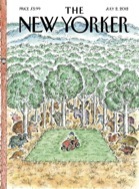Clifford Garstang's Blog, page 100
June 29, 2012
What the Zhang Boys Know is now available for pre-order
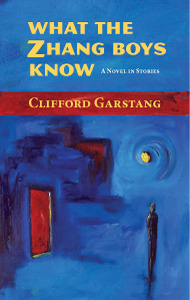 My novel in stories, What the Zhang Boys Know, is now available for pre-order from the publisher, Press 53. Go here to reserve your autographed copy, scheduled to ship in mid-August, weeks before the official publication date.
My novel in stories, What the Zhang Boys Know, is now available for pre-order from the publisher, Press 53. Go here to reserve your autographed copy, scheduled to ship in mid-August, weeks before the official publication date.
Set in a condominium building on the edge of Chinatown in Washington, D.C., these stories present the struggle of Zhang Feng-qi, originally from Shanghai, to find a new mother for his sons following the death of his American wife. Along the way, the stories spotlight Zhang’s neighbors as they seek to fill gaps in their own lives. And then there are the Zhang boys, who firmly believe that their mother is coming back. What is it that they know?
Praise for What the Zhang Boys Know
“A widower, a sculptor, a minor poet, an interior designer, and a painter are just a few of Clifford Garstang’s affecting characters, residents of Nanking Mansion, the setting for these deeply satisfying, life-affirming stories linked by neighborliness in a ‘not-quite-gentrified’ neighborhood. Garstang’s characters strive to transcend ‘the deep quite of absence’ in the wake of all manners of devastations. They leave their doors unlocked, they console, they make room, they share what they have made of sorrow, so proving, as do these stories, the solace to be found in art.”
— Christine Schutt, author of National Book Award-finalist Florida , and Pulitzer Prize-finalist All Souls .
“What the Zhang Boys Know has a dozen chapters, each one a vivid short story in itself. Garstang makes the whole greater than the sum of its parts. The lives of the inhabitants of a condominium in Washington, D.C.’s Chinatown are told separately and as part of a web of entanglements. The entrances and exits are handled with the deftness of a French comedy, but the empathy of the author brings all the characters achingly alive. What the Zhang Boys Know is a wonderful and haunting book.”
— John Casey, author of Compass Rose and Spartina , winner of the National Book Award.
“Clifford Garstang presents one of the more memorably settings I’ve seen in any book, Nanking Mansion, a renovated tenement in D.C.’s Chinatown, filled with characters whose stories are more fantastic than they first appear. In prose that is measured and confident, he carefully works to show us how these characters’ grief and loneliness becomes unified by their collective setting to transform into something utterly beautiful and unforgettable. What a world Garstang has built for us, and how grateful I was to discover it.”
— Kevin Wilson, author of Tunneling to the Center of the Earth and NYT Best Seller The Family Fang
“In the tradition of the best volumes of linked stories, from Susan Minot’s Monkeys and Rand Cooper’s The Last to Go to David Schickler’s Kissing in Manhattan, Clifford Garstang’s What the Zhang Boys Know traces a gracefuly arc, as the meanings and moments in the stories accrue. Garstang’s inventive and original writing, a beguiling invitation to myriad subplots and destinations, offers what every reader desires: a lucid and satisfying experience of literature.”
— Katharine Weber, author of Triangle, True Confections, The Memory of All That
June 28, 2012
“The Year of the Rooster” in r.kv.r.y
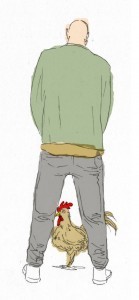 I’m very pleased to have a short piece up in the summer issue of r.kv.r.y, a beautiful magazine edited by Mary Akers. This issue has an Asia theme. I hope you enjoy “The Year of the Rooster.”
I’m very pleased to have a short piece up in the summer issue of r.kv.r.y, a beautiful magazine edited by Mary Akers. This issue has an Asia theme. I hope you enjoy “The Year of the Rooster.”
June 26, 2012
The New Yorker: “Another Life” by Paul La Farge
July 2, 2012: “Another Life” by Paul La Farge
While the Q&A with Paul La Farge provides some valuable insight into this story, that makes the story worth reading, I still don’t love it. While there are some nice touches—the influence of Rousseau, the purposeful shift in point of view, the possible metafictional ending—it still boils down to a guy with a midlife crisis who does a creepy thing and deserves what he gets, at least in the eyes of the narrator, and the metafictional author.
The story is about “the husband” (unnamed) who is uncomfortable in his eleven-year-old marriage and is, maybe, feeling unfulfilled in his career. He has bailed on a birthday party for his father-in-law and comes to a bar, where he is attracted to a pretty bartender. After they have sex and do cocaine in the restroom, the heart problem that he has denied he has appears to show itself, creating a somewhat uncertain ending. But the twist to the ending is that we already know the bartender is taking a fiction course in college and there is a suggestion that she has written the story we are reading. Which means, how much of the story is true? She’s been in control all along, so what do we really know about “the husband?” Only what she has told us, and she’s manipulating us to justify the choice she makes in the end.
Maybe. Still didn’t love it, but the metafictional twist redeems the story for me.
July 2, 2012: “Another Life” by Paul La Farge
While the ...
July 2, 2012: “Another Life” by Paul La Farge
While the Q&A with Paul La Farge provides some valuable insight into this story, that makes the story worth reading, I still don’t love it. While there are some nice touches—the influence of Rousseau, the purposeful shift in point of view, the possible metafictional ending—it still boils down to a guy with a midlife crisis who does a creepy thing and deserves what he gets, at least in the eyes of the narrator, and the metafictional author.
The story is about “the husband” (unnamed) who is uncomfortable in his eleven-year-old marriage and is, maybe, feeling unfulfilled in his career. He has bailed on a birthday party for his father-in-law and comes to a bar, where he is attracted to a pretty bartender. After they have sex and do cocaine in the restroom, the heart problem that he has denied he has appears to show itself, creating a somewhat uncertain ending. But the twist to the ending is that we already know the bartender is taking a fiction course in college and there is a suggestion that she has written the story we are reading. Which means, how much of the story is true? She’s been in control all along, so what do we really know about “the husband?” Only what she has told us, and she’s manipulating us to justify the choice she makes in the end.
Maybe. Still didn’t love it, but the metafictional twist redeems the story for me.
June 25, 2012
The New Yorker: “Means of Suppressing Demonstrations” by Shani Boianjiu
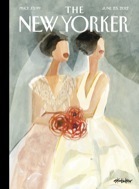 June 25, 2012: “Means of Suppressing Demonstrations” by Shani Boianjiu
June 25, 2012: “Means of Suppressing Demonstrations” by Shani Boianjiu
Good news and more good news. This story is available for free on the website and it’s a really good story, in my opinion.
It’s about Lea, a young woman nearing the completion of her service in the Israeli Army. She doesn’t feel, though, and she doesn’t want, and that makes her, ironically, vulnerable. She’s having sex with one of the younger soldiers at the remote outpost where they’re both stationed, trying to feel something. She has him read tragic stories from the newspaper, but still she feels nothing.
And then some Palestinian demonstrators show up, begging to be “dispersed.” Lea gets out the instructions for the means of suppressing demonstrations and tries each of the means out: first shock grenades, then tear gas, then rubber bullets. The last option is live fire, and the demonstrators return to beg her to shoot them—and miss—so that they’ll be written about in the paper.
They want this desperately; she wants nothing. And this, finally moves her. For more, read the Q&A with Shani Boianjiu, which reveals that the character of Lea is from the author’s novel (although whether this story is an excerpt or is independent isn’t clear).
June 24, 2012
The Good Men Project interviews me
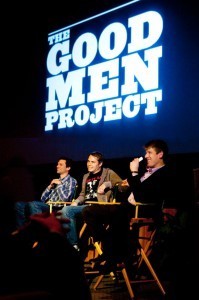 Have you heard about The Good Men Project? It’s a web-based alternative to the glossy magazines that I’ve come to despise. Here’s an excerpt from the site’s “about us” page:
Have you heard about The Good Men Project? It’s a web-based alternative to the glossy magazines that I’ve come to despise. Here’s an excerpt from the site’s “about us” page:
Guys today are neither the mindless, sex-obsessed buffoons nor the stoic automatons our culture so often makes them out to be. Our community is smart, compassionate, curious, and open-minded; they strive to be good fathers and husbands, citizens and friends, to lead by example at home and in the workplace, and to understand their role in a changing world. The Good Men Project is a place where that happens. We’re glad to have you along for the ride.
Having long given up on GQ and Esquire to tell me anything I really needed to know, I’m really glad to have TGMP to fill the gap.
And recently, Cameron Conaway did me the great honor of interviewing me for the site: Man-to-man with lawyer turned author Clifford Garstang.
June 23, 2012
The New Yorker: “The Golden Vanity” by Brian Lerner
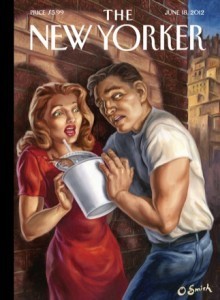 June 18, 2012: “The Golden Vanity” by Ben Lerner
June 18, 2012: “The Golden Vanity” by Ben Lerner
Although a reader can “get” this story (except that it’s behind the paywall), it is comforting to read the Q&A with Ben Lerner, which at least articulates some of what the author was trying to do. For example, I understood on first reading that there were levels of reality here, and that the narrator isn’t entirely reliable. In the Q&A, Lerner says: “The piece is concerned with raising questions about the relation between fact and fiction, activating those questions in peculiar ways—but the questions, not the answers, are what strike me as interesting.”
So. The main character of the piece, “the author,” has recently published a novel (which is also true of Lerner, the author). He has issues with meeting other people, including facing the question of how autobiographical his novel is—which of course is something most fiction writers face. This anxiety is compounded when he goes to the dentist to have wisdom teeth extracted, and he has to choose between I.V. anesthetic and a local shot. He chooses the I.V., but for him it raises the question of what happened and did not happen.
The x-ray for the dental work reveals a mass that a neurologist identifies as a tumor that is probably benign. The character is told to watch out for symptoms, one of which is temporal distortion, but of course the whole story is temporally distorted.
And there’s more, such as when he travels on a family vacation with his new girlfriend Hannah (or is she?) and is asked about Ari, someone we don’t know.
It’s all a bit disturbing and the reader isn’t sure whether any of the story is true. But then, none of it is strictly true. It’s fiction.
I liked this a lot.
You (and I) might be interested in the author’s novel Leaving the Atocha Station.
Prime Number Magazine Update 19.5, plus NEWS
 Prime Decimals 19.5–the latest update to Issue 19 of Prime Number–is now live and features poetry by Lois Marie Harrod and Sean Thomas Dougherty and flash fiction by Gerald Fleming, Cezarija Abartis, and Mamie Potter.
Prime Decimals 19.5–the latest update to Issue 19 of Prime Number–is now live and features poetry by Lois Marie Harrod and Sean Thomas Dougherty and flash fiction by Gerald Fleming, Cezarija Abartis, and Mamie Potter.
Plus, we’re pleased to announce that we’re now accepting longer stories and creative nonfiction–up to 5,000 words. Please visit our submission guidelines for more information.
June 22, 2012
eBook Price Going Up; Buy Now!
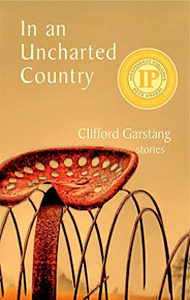 Since publication, the price for the Kindle and Nook editions of In an Uncharted Country has been set by my publisher at $3.99. Press 53 has just informed its authors that the price will be going up to $7.99 on July 1. While this looks like a significant increase, it’s still much lower than most eBooks, which are generally priced at $9.99 or higher.
Since publication, the price for the Kindle and Nook editions of In an Uncharted Country has been set by my publisher at $3.99. Press 53 has just informed its authors that the price will be going up to $7.99 on July 1. While this looks like a significant increase, it’s still much lower than most eBooks, which are generally priced at $9.99 or higher.
But July 1 is still over a week away, so you’ve got plenty of time to take advantage of the lower price. Buy the Kindle version, or the Nook version.
June 20, 2012
Tips for Writers: Setting Goals
 Today, June 20, is the first day of Summer in the Northern Hemisphere. School is out. Work schedules are relaxed. Football season is a couple of months away, so there’s nothing good to watch on television (apologies to baseball fans). Time to get some writing done.
Today, June 20, is the first day of Summer in the Northern Hemisphere. School is out. Work schedules are relaxed. Football season is a couple of months away, so there’s nothing good to watch on television (apologies to baseball fans). Time to get some writing done.
In fact, I know a lot of writers who can only write during the summer because of their teaching duties. I don’t teach, but it still seems as though I have fewer demands on my time in the summer (except for lawn and garden, which need constant attention). So today seemed like a good day to talk about goals.
I think some writers don’t think in terms of goals. They write as much as they can, when they can, and watch the words, paragraphs, pages mount up. But I like a little more pressure than that. I like to have something to shoot for, and because I’m at the beginning of a new novel project (although I confess I’ve got the rough draft I did during Nanowrimo last year, and that’s a decent guide for where I want to go in this book), I’m keen to look forward and see where I’d like to be on Labor Day weekend, 10 weeks from now.
Goal: 5,000 words a week, 50,000 by Labor Day.
That’s only 1,000 words a day, and should be doable. What’s your goal?

